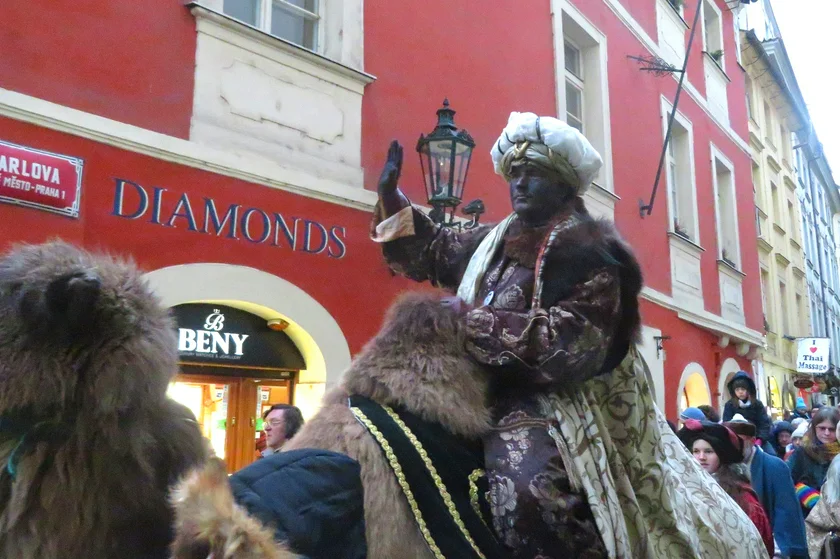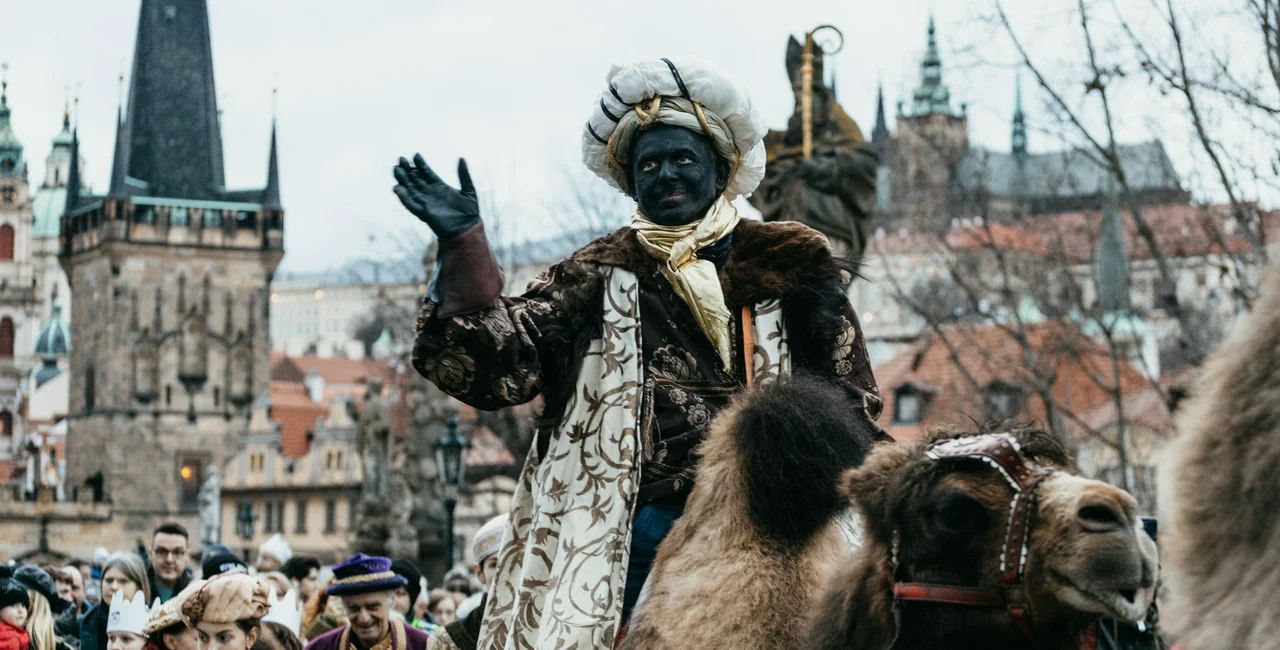The use of blackface on one of the Three Kings in the annual parade in Prague has sparked a debate on social media and launched a petition calling for the practice to end.
While displays such as this one have a long tradition, in recent years across Europe people have been finding the depictions offensive and say it is time for them to stop.
The Three Kings – Caspar, Melchior, and Balthazar – are the biblical figures who according to Christian tradition brought gifts to the infant Jesus on the Epiphany, celebrated on Jan. 6.
Balthazar by some traditions is depicted as African, while Caspar represents Asia and Melchior represents Europe. Depictions of Balthazar as black can be found in paintings as far back as the 12th century.
Do you think the practice of blackface should be banned in Czechia?
Parade figure sparks a social media discussion
The main parade in Prague, which goes from Malá Strana, across Charles Bridge to Old Town Square, is organized by Charita Česká republika, a Roman Catholic charity. Children also dress up and go around in groups of three to collect money on the street, with one of the three sometimes with a darkened face.
A photo of Balthazar in blackface posted on the Facebook page of news station ČT24 sparked a discussion, with several people objecting.
“Blackface in 2023 is really not okay,” was one of the comments. Several asked why a black person from the congregation couldn’t be used instead.
Not all of the comments were negative though, and many people did not see any intent to cause offense.
One of the first people to comment on the photo has also started a petition calling for the practice to stop. Tereza Navrátil Šimonová, a member of the African-Czech ethnic group, said the practice is deeply disrespectful, hurtful, and humiliating for non-white residents of the Czech Republic.
“In Western countries, this ‘mask’ is already being abandoned, and I believe that if the Czech Republic wants to belong to the West, it will stop appearing in our streets as well,” Navrátil Šimonová said in her petition.
She outlines the history of blackface in the U.S., where it was often used to reinforce negative stereotypes, adding that racism also exists in Czechia and is supported by actions such as blackface.

“I understand that this is a sort of tradition, but ultimately, shouldn't all sages coming from the East be non-European in appearance? Is it really that hard to actually hire a black man to play the third wise man in the big cities?” she said.
She acknowledged that Charita ČR did not intend to offend or harm anyone. “I also believe that it is capably possible at the level of official processions to realize the figures of the Three Kings in such a way that they are not offensive and at the same time [ensure that] tradition is preserved,” she said.
Charity says it will examine the issue
Charita ČR spokesman Jan Oulík told news server Refresher.cz that the charity is now having an extended discussion about the issue.
"We haven't come to any final verdict yet, as this is a new thing in our internal networks. So we don't have the result yet, but we are intensively discussing it and trying to argue, possibly introduce adjustments," Oulík said.
He added that the charity is not taking the issue lightly. “In today's context, some customs may look incorrect. We are taking it seriously, we are thinking about it, and we are looking for a solution," Oulík said.
Coming to terms across Europe
Czechia is not alone in facing this issue. In Spain, efforts to end the use of blackface in Three Kings parades go back to at least 2008. Then-German Chancellor Angela Merkel met with international criticism in 2013 when she was pictured posing with children, some of whom had blackened faces.
In the Netherlands, St. Nicholas is depicted with a companion named Black Peter, who is often a character in blackface. In recent years, there have been efforts to change this practice to depict Peter as simply being covered in soot from a chimney, due to objections that the original Black Peter promotes stereotypes.
The issue of blackface has also previously come up in Czechia. Celebrity impersonators are now banned from using blackface on the TV show “Tvoje tvář má známý hlas” (Your Face Sounds Familiar), as the show is made under license and the parent company objected.
A Czech production of Irish playwright Martin McDonagh’s “A Behanding in Spokane,” which had been in the repertoire at Činoherní klub since 2011, was also canceled in 2021 when the playwright started to require that one of the main roles be played by an actor who was a descendant of black Africans or black Caribbean residents. The local production had been using an actor in dark makeup.












 Reading time: 4 minutes
Reading time: 4 minutes 































